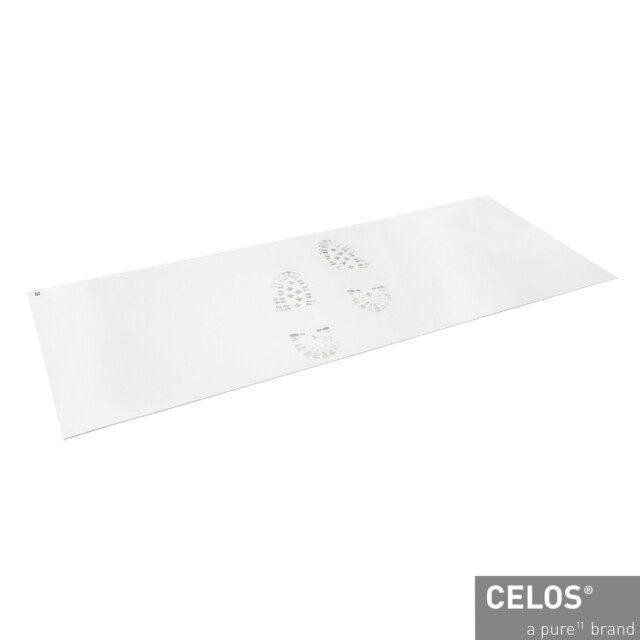
17.07.23
Nitrile gloves or latex gloves – why nitrile is preferred
More and more customers are choosing to switch from latex to nitrile gloves when purchasing cleanroom gloves. In this article, you will learn why nitrile gloves are so popular and what complications can be caused by wearing them.

What are latex gloves?
To understand what latex gloves are, we must first clarify what latex is. Latex is a natural product obtained from the milky sap of the rubber tree. It is natural rubber or natural rubber that is biodegradable. However, latex can cause allergic reactions. For a long time, we had to accept this because latex was the only material on the market that was robust enough for use in gloves for medical, food and cleaning applications.
Today, however, there are alternative materials that are more widely available and serve as an alternative to latex gloves. Reasons for using latex gloves, even though there are alternatives, are habit, internal guidelines and comfort.
What are nitrile gloves?
Nitrile gloves are an alternative to latex gloves. As the name implies, they are made of nitrile, a synthetic rubber compound. So, unlike latex, nitrile is manufactured artificially. However, there are also biodegradable versions of nitrile gloves.
Why are nitrile gloves better than latex gloves?
Nitrile gloves offer a number of advantages over other materials, especially latex:
- Highest puncture resistance compared to any other glove material
- Better chemical resistance compared to latex and vinyl
- Long durability
- Improved fingertip feel (haptics)
- Better post-cleaning possibilities and therefore higher cleanliness
- Possible alternative in case of latex allergy, as the allergy risk is reduced with nitrile
- Less skin irritation
Among the disadvantages of nitrile gloves compared to latex gloves is that the latter are less expensive. However, latex gloves are also not as high quality. If there is no latex allergy and the higher puncture resistance and better chemical resistance are not important, you can also reach for latex gloves.
| Advantages of nitrile gloves and latex gloves | |
| nitrile gloves | latex gloves |
| highest puncture resistance | |
| better chemical resistance | |
| long durability | |
| allergic reactions much less frequent | |
| less skin irritations | |
| higher purity | |
| good fit | comfortable fit |
| wearable over a longer period of time | wearable over a longer period of time |
| meanwhile better fingertip feeling (haptics) | good fingertip feeling (haptics) |
| high wearing comfort | high wearing comfort |
| partly biodegradable designs | biodegradable designs |
| inexpensive |
Latex allergy
A natural latex allergy is an allergy to latex proteins, which is why it is also called a protein allergy. This allergy can even lead to anaphylactic shock, which can be fatal in the worst cases.
A natural latex allergy can cause a variety of symptoms, including:
- Severe itching of the skin
- Tingling of the skin
- Inflammation of the nasal mucosa
- Conjunctivitis
- Swelling of the skin surface and larynx
- Edema in the tissues
- Abdominal cramps
- General itching
- Hives
- Hives (Urticaria)
- Nausea
- Diarrhea
- Palpitations
- Cardiac arrest and respiratory failure
- Dizzy spells
- Low blood pressure
- Asthma-like symptoms
- Narrowing of the airways
It is important to take a natural latex allergy seriously and seek immediate medical attention if symptoms occur. People with this allergy should avoid all contact with latex products to prevent allergic reactions. There are several alternative glove materials, such as nitrile gloves, which are free of latex proteins and therefore safer for people with a latex allergy.
Glove-related allergic contact dermatitis
Allergic contact dermatitis can be caused by vulcanization accelerators, plasticizers, stabilizers, antioxidants, biocides, preservatives, process accelerators and other substances found in or on the gloves.
Symptoms of contact allergy may include the following:
- Blotchy redness of the skin
- Itching
- Swelling
- Formation of blisters
If latex gloves are used and allergic reactions occur, this may not be a latex allergy, but an allergy to the plasticizer, vulcanization accelerator or other substances contained in the gloves. Plasticizers and vulcanization accelerators are also contained in nitrile gloves. However, if you are allergic to vulcanization accelerators, you can use special nitrile gloves that do not contain such accelerators.
We recommend the nitrile glove CELOS 1.10
If you are looking for a high quality nitrile glove, we recommend the nitrile glove CELOS Glove 1.10. This nitrile glove is best suited as a cleanroom glove and is recommended for cleanroom classes ISO 4-9.
The nitrile glove “CELOS Glove 1.10″ is available in white and in sizes XS to 3XL. It has a length of 30 cm (12 “). The nitrile gloves are double underpacked in PE film suitable for cleanrooms and sealed under vacuum. Per sales unit 1’000 gloves are delivered, divided into 10 bags of 100 pieces.
This nitrile glove offers the following properties:
- Contains no latex
- Reduced allergy risk
- No use of vulcanization accelerators in the manufacturing process
- Unpowdered
- High degree of purity: post-cleaning with 0.2 µm filtered deionized water
- Ambidextrous wearable
- Acceptable Quality Level (AQL value) is 1.5
- Very good fit
- Close fitting cuff
- High wearing comfort
- Excellent fingertip feeling
- Textured fingertips
- Very good grip
- Very tear resistant
- Very puncture resistant
- Low particle and ion residue levels
- Good surface resistance (= ESD compliant)
Compared to other cleanroom gloves, the “CELOS Glove 1.10” contains nitrile glove contains significantly fewer chemical additives. This applies in particular to sulfur.
We are happy to advise you
In addition to the “CELOS Glove 1.10”, we at abovo AG also offer a selection of other nitrile gloves as well as cleanroom gloves made of other materials, such as latex, in our online store.
If you are unsure which type of cleanroom glove is best suited for your application, our experts will be happy to advise you. You can contact us without obligation by e-mail (info@abovo.ch) or also by telephone (+41 32 552 44 44).
Sources
https://www.abovo.ch/wissenswertes/handschuh-allergie/
https://www.abovo.ch/wissenswertes/nitrilhandschuhe-vs-latexhandschuhe/
https://www.abovo.ch/produkt/nitrilhandschuhe-celos-glove-1-10-1982859/



Tell us what you think
Be the first to comment this post.
You must be logged in to leave a comment.